RESEARCH
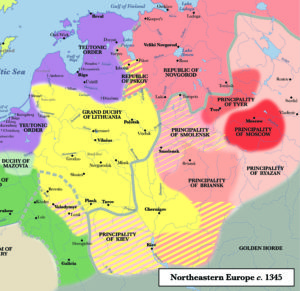 My research examines cross-cultural interaction on the Baltic frontier in the Middle Ages and the role of literary representation in shaping conflict. I work with Latin and Old Russian sources. My dissertation, “Between Two Worlds: A Comparative Study of the Representations of Pagan Lithuania in the Chronicles of the Teutonic Order and Rus’” (2015) was the first comprehensive comparative study of the literary images of pagan Lithuania in the chronicles of the Teutonic Order and Rus’. The broader aim of my research is to challenge the epistemological foundations of binary cultural classifications by demonstrating the power of literary representation in the construction of cultural boundaries.
My research examines cross-cultural interaction on the Baltic frontier in the Middle Ages and the role of literary representation in shaping conflict. I work with Latin and Old Russian sources. My dissertation, “Between Two Worlds: A Comparative Study of the Representations of Pagan Lithuania in the Chronicles of the Teutonic Order and Rus’” (2015) was the first comprehensive comparative study of the literary images of pagan Lithuania in the chronicles of the Teutonic Order and Rus’. The broader aim of my research is to challenge the epistemological foundations of binary cultural classifications by demonstrating the power of literary representation in the construction of cultural boundaries.
My research has been generously funded by the Fulbright Program and the American Council of Learned Studies. I have presented my work worldwide, including at the German Historical Institute in Warsaw, Poland, the Herder Institute in Marburg, Germany, the meeting of the Medieval Academy of America in Los Angeles, California, and the Association for the Advancement of Baltic Studies at the University of Pennsylvania.
I am currently preparing two articles for publication: “Through Enemy Eyes: Representing Conflict on the Rus’ ian-Lithuanian Frontier in the Middle Ages” (2018) and “Between Admiration and Defamation: Reimagining the Knightly Ideal in the Wars against Lithuanians” (2018).
MULTIMODAL PEDOGOGY
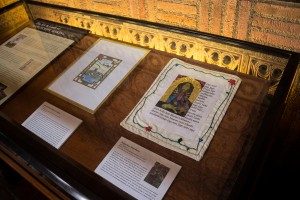 As studies that challenge the traditional emphasis on verbal/linguistic and mathematical/logical ability as a measure of intelligence have shown, there are at least nine intelligences or learning styles. I believe it is necessary to adjust instructional strategies to meet the variety of student needs and allow each student to learn in a way that builds on his or her strengths. In designing my courses, I first set out the learning outcomes and then choose a variety of assignments that meet the course objectives by engaging different intelligences. My assignments include role-playing, debate, community engagement, library projects, as well as more traditional written analysis.
As studies that challenge the traditional emphasis on verbal/linguistic and mathematical/logical ability as a measure of intelligence have shown, there are at least nine intelligences or learning styles. I believe it is necessary to adjust instructional strategies to meet the variety of student needs and allow each student to learn in a way that builds on his or her strengths. In designing my courses, I first set out the learning outcomes and then choose a variety of assignments that meet the course objectives by engaging different intelligences. My assignments include role-playing, debate, community engagement, library projects, as well as more traditional written analysis.
I am currently curating an art exhibit with my students called “Inspirational Illuminations: Reacting to Medieval Manuscripts”. The exhibit features a selection of projects exploring the correlations between medieval gender expectations and modern conceptions of sexuality. The exhibit is featured in the UCLA DailyBruin.
PUBLIC HISTORY
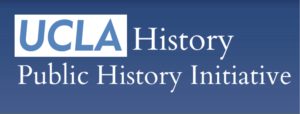
As the program coordinator of the UCLA Public History Initiative, my mission is to move the insights and expertise of the UCLA Department of History beyond the academy into the realm of the general public. I work closely with cultural organizations, museums, and archives in the LA area to plan programming and develop internships opportunities for undergraduate students.
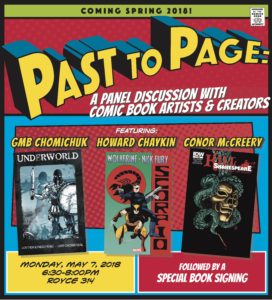
I also continue to develop, organize, and host programs to increase public contact and awareness of the impact of medieval and Renaissance themes on contemporary society and culture. In May 2018, I planned and organized UCLA Comic-Con 2018 with the support of the Center for Medieval and Renaissance Studies. The two-day event featured a series of workshops on creative writing and illustration culminating in a panel discussion on featuring comic creators Conor McCreery (Kill Shakespeare, IDW Publishers), GMB Chomichuk (Midnight City, Infinitum) and industry veteran Howard Chaykin (The Divided States of Hysteria,Marvel, and DC Comics).
Read about the event in the UCLA DailyBruin.
K-12 OUTREACH
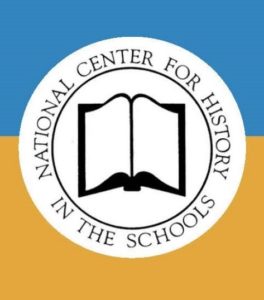
I have been involved in K-12 education since 2007 when I had the opportunity to teach for a year at JobCorps, the nation’s largest no-cost career training and education program for young adults who qualify as low income. My experience at JobCorps was critical in inspiring my life-long commitment to enhancing K-12 education. As a graduate student, I regularly volunteered at high schools in the LA area by judging History Day projects, offering college preparation assistance, and helping with annual events such as “Mock Interview Day.” In 2015, I designed a five-week writing workshop to help senior high school students at Sonia Sotomayor’s School of History and Dramatic Arts develop a foundation for academic writing. The workshop has since been incorporated into the school’s history writing curriculum.
Since July 2017, I have served as program coordinator of the National Center for History in the Schools, an organization that nurtures ties between the historical profession and classroom teachers through publications and professional development workshops.
INNOVATION IN DISTANCE LEARNING & DELIVERY STRATEGIES
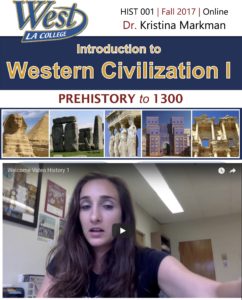
Over three consecutive summers, I had the opportunity to co-design and teach the first online history courses at UCLA. My experience in online teaching and course development earned me the opportunity to redesign the History 1-2 course sequence at West Los Angeles Community College. I design my courses to take advantage of e-tools (e-books, videos, virtual city tours, and social media, etc.) as well as the students’ immediate environment (museums, music concert, libraries, etc.).
I believe that online education allows for a degree of student exploration beyond what is possible in the temporal constraints of a classroom and provides a unique opportunity for students to improve their writing through systematic weekly practice. Moreover, the convenience and adaptability of online education has the potential to shrink the long-standing gap between students with direct access to the classroom and those without. My goal is to bring to an online environment the same intimacy and immediacy of experience that students receive in a traditional classroom.
CAREER DIVERSITY FOR HISTORIANS
 In 2015, I joined UCLA’s pilot program of the American Historical Association’s career diversity initiative sponsored by the Andrew W. Mellon Foundation. The same year, I co-organized the “Futures of History” conference with the goal of promoting new ways to conceptualize the discipline of history and the broad application of a historian’s skills in the public as well as private sector. I am currently part of a nationwide community of scholars and educators “working to explore the culture and practice of graduate education and how it can better support the changing needs of PhD students.” (AHA)
In 2015, I joined UCLA’s pilot program of the American Historical Association’s career diversity initiative sponsored by the Andrew W. Mellon Foundation. The same year, I co-organized the “Futures of History” conference with the goal of promoting new ways to conceptualize the discipline of history and the broad application of a historian’s skills in the public as well as private sector. I am currently part of a nationwide community of scholars and educators “working to explore the culture and practice of graduate education and how it can better support the changing needs of PhD students.” (AHA)
As an advocate of career diversity, I was invited to speak at the Medieval Congress at Western Michigan University in 2015 and 2016. My blog on the responsibility of departments in preparing history students for success in the job market is available via the AHA.
More recently, I have used my experience with graduate career diversity to create a series of workshops on career preparation for undergraduates.